Name:MPCyV Large T-Antigen Antibody Clone CM2B4
Description and applications: Merkel cells are round neuroendocrine cells found in skin where they form synaptic complexes with
somatosensory afferent fibres. These complexes are responsible for fine touch and produce various neuroactive substances that act as fast-acting skin neurotransmitters or neuromodulators. In pathological conditions, Merkel cells can proliferate and generate a rare but very aggressive form of skin cancer known as Merkel cell carcinoma (CCM). Around 80% of CMMs are caused by the recently described Merkel cell polyomavirus (MCPyV or MCV), which integrates into the genome of Merkel cells and proliferates clonally. The MCPyV virus is a nonencapsulated DNA virus consisting of two early units (two T antigens, one large and one small) and three late units (VP1, 2, and 3). The large T antigen is the MCPyV’s functional nuclear protein, which has a molecular mass of 125 kDa and is expressed in tumour cells, where it binds to cell cycle suppressor molecules, degrades and sequesters them, promoting their S phase. The large T antigen has natural truncated mutations that also produce functionally active proteins of smaller size. The CM2B4 antibody, which shows no cross-staining with other types of polyomavirus and recognises the MCPyV large T antigen, has been synthesized against a peptide derived from exon 2 of the mentioned antigen’s locus, for which it is highly specific, as well as for its 57kT isoforms; however, it may not detect some of its minor truncated forms. CM2B4, assessed along with a panel of markers including cytokeratins 20 and 7, p63, TTF1, neuronspecific enolase, S100 protein, HMB45, and CD45, facilitates the diagnosis of approximately 80% of classical Merkel cell carcinoma cases. However, most CCM cases with eccrine, squamous, rhabdomyoblastic, leiomyosarcomatous, or neuroblastic divergent differentiation are MCPyV negative and are associated with a worse prognosis of the disease. In comparison with MCPyV level detection using PCR, the antibody has a sensitivity of 95% and a specificity of 83% since, as mentioned above, MCPyV negative CCM cases have been observed, as well as occasional positivity of uncertain meaning in mature lymphocytes, sweat glands, and vascular endothelium.
Composition: Anti-human MPCyV Large T-Antigen mouse monoclonal antibody purified from serum and prepared in 10mM PBS, pH 7.4, with 0.2% BSA and 0.09% sodium azide.


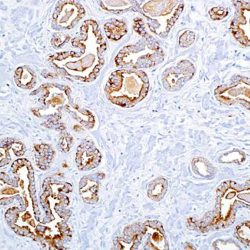
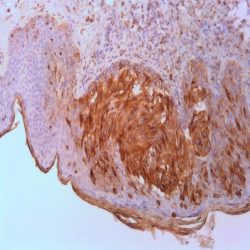
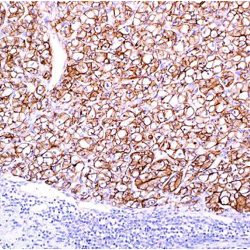
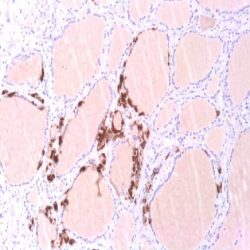
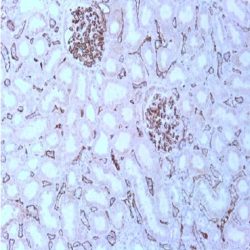
Reviews
There are no reviews yet.